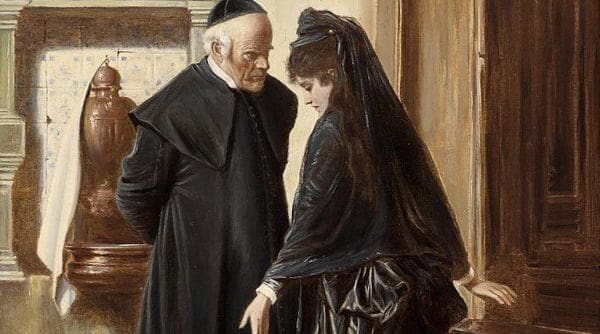Dear Dan, My director is a wonderful, caring person but is also quite a bit less inclined to follow the magisterium than I am. I wish I had the opportunity to see a faithful priest from time to time. I have tried hard to find a priest willing to provide me with spiritual direction  (especially now, as I am going through some severe moral crises and sufferings); however, I have been turned down repeatedly because they are too busy to meet with any individuals, especially if it would be for more than one brief meeting. This appears to be a serious problem: if a priest is too busy to give spiritual and moral guidance to a faithful follower who is facing grave hardship, then that priest is TOO busy. Why do priests seem to regard spiritual direction as an unreasonable burden?
(especially now, as I am going through some severe moral crises and sufferings); however, I have been turned down repeatedly because they are too busy to meet with any individuals, especially if it would be for more than one brief meeting. This appears to be a serious problem: if a priest is too busy to give spiritual and moral guidance to a faithful follower who is facing grave hardship, then that priest is TOO busy. Why do priests seem to regard spiritual direction as an unreasonable burden?
I would begin by saying that not all priests regard spiritual direction as a burden. Many priests that I know consider it one of their main priorities. In fact, after celebrating the sacraments and preaching the Word, it is one of the best ways that a priest has to help others. And perhaps herein we find one possible reason for your experience that priests just don’t have time: they may have many Masses to celebrate (especially on Sundays) and multiple confessions to hear, especially if we reflect on the fact that most priests help out in at least one other parish than their own on a regular basis. When you throw in the preaching that must be prepared, the time begins to add up. The biggest burden for the priest, however, is usually parish administration. Before being ordained, he probably does not realize the amount of time this will pilfer from his apostolate and, in many cases, how much worry it will cause. All of this may leave him wary about taking on more and more stable commitments. But enough about reasons or excuses; there are many more than I mention here – objective as well as subjective ones.
The fact remains that spiritual direction is a vital help and you have not been able to find a priest director. This must be very frustrating. You are not alone in this challenge.
Aside from giving you insight into the burden most priests carry, another way I can think to assist you is to point out a few options for finding a director that you may not have considered. Here are a few ideas:
- Your Diocesan Office: There are several types of leads you can find by calling your diocese. First, they can point you to those known for spiritual direction in your area. Second, they can also point you to religious orders or retreat centers in your area. Also, don’t hesitate to venture beyond your own diocesan boundaries if the list of options runs too short. Don’t hesitate to consider a well-trained and experienced lay person as an option as well.
- Priests/Confessors in Your Parish or Surrounding Parishes: If you have found a good confessor, someone who has been particularly helpful to you with advice or dialogue during or after confession, don’t hesitate to ask them one simple question: “I would be grateful if I could follow up with you on this matter in the near future; can I call you for an appointment?”
- Faithful Catholic Affiliation Groups: If you have groups in your diocese like Catholic Scripture Study, Catholics United for the Faith, ENDOW, Walking with Purpose, or other solid groups, begin attending their meetings and connecting with people who take their faith seriously.
An important thing to remember is that this might be a long process and if you are called to it, you need to maintain your commitment for as long as it takes. Our God knows your needs and desires to bring you closer to himself, and he will do so as long as you keep striving and stumbling towards him. Sometimes the painstaking search for an orthodox director is just as important to the process as spiritual direction itself.
A semi-shortcut through this maze can be found in the many faithful movements and orders within the Church. Those that have maintained a solid grip on magisterial faithful Catholicism often provide means for their members to deepen their faith in many helpful ways, including spiritual direction. Essentially, when approaching these organizations we are looking to adopt a rule of life. That is, we are looking for a specific spiritual path that can help to focus our spiritual disciplines and practice of virtue. Often these organizations follow the fruitful paths of the saints who founded them (like Saint Francis and the Franciscans) or those who played significant roles within them (like Saint John of the Cross in the Carmelite order). Obviously, becoming a third-order or lay Carmelite or Franciscan is a serious commitment. However, for those who take their faith seriously, these commitments have benefits that far outweigh any related challenges.
To be clear, it is not necessary to become a cloistered nun or a hermit to reap the benefits of these beautiful gifts to the Church. Most of them have lay organizations for people just like you. A few good examples of more recent spiritualities that have emerged in the Church are Apostles of the Interior Life (http://www.apostlesofil.com/our-locations/kansas-city-usa-provincial-house), Opus Dei (www.opusdei.org), and Regnum Christi (www.regnumchristi.org). The constitutions or canonical provisions of these and many more are approved either by the Holy See or local bishops, and the direction they provide for the spiritual life can be of enormous spiritual value. You can contact these organizations via their Web sites to find information about activities in your area.
Spiritual direction is making a comeback in the Church, and seminary formation programs are rediscovering its tremendous value. Hopefully, little by little the challenges that we are facing in this area will be a thing of the past. Don’t get discouraged. The obstacles you are facing might be the very thing you need right now to deepen your faith. Christ is at work in you. Yield to that work and continue to strive to know him.
+
Art for this post on priests being too busy for spiritual direction: Ein ernstes Gespräch (A Serious Conversation), Ludwig Johann Passini, by 1903, PD-US author’s life plus 100 years or less, Wikimedia Commons.




